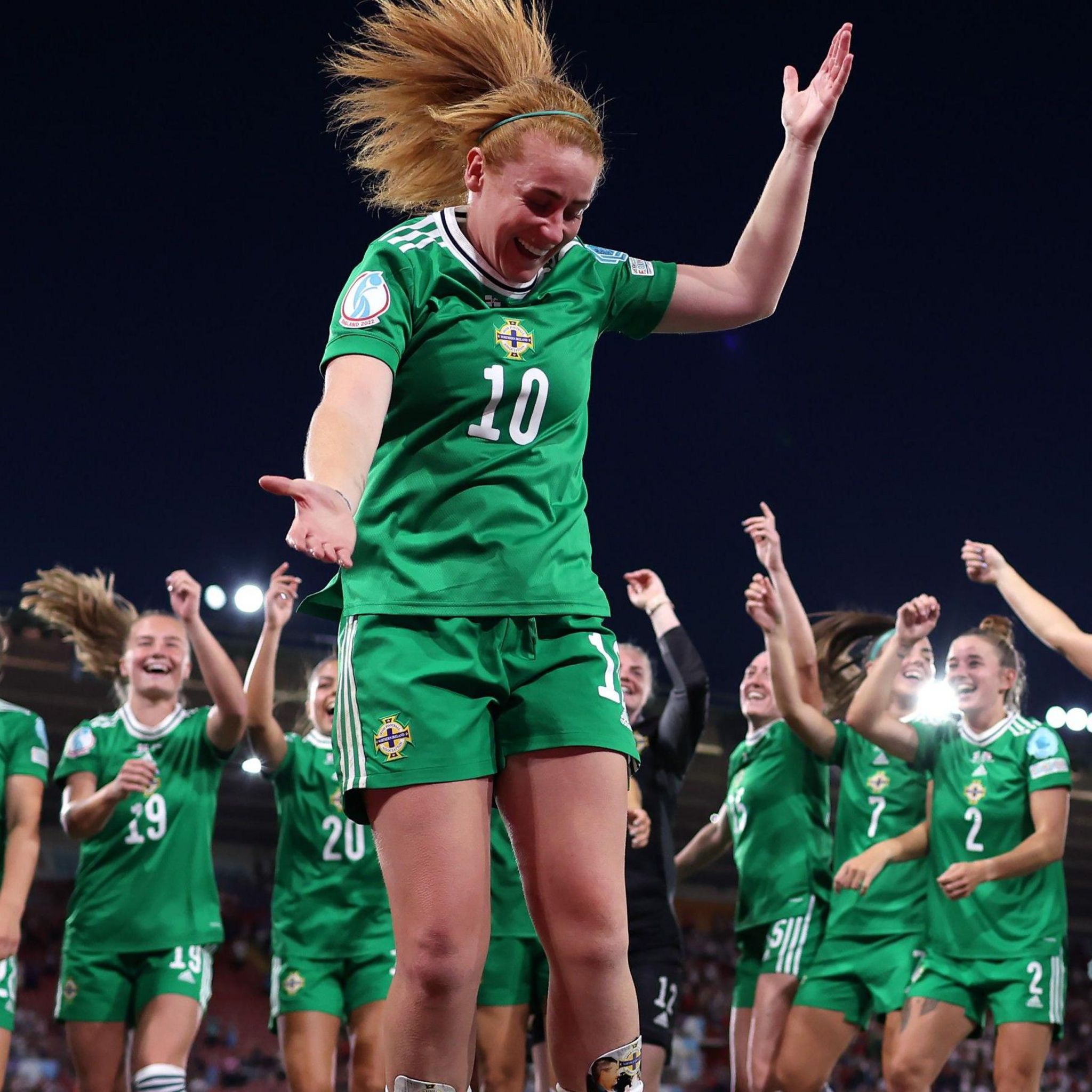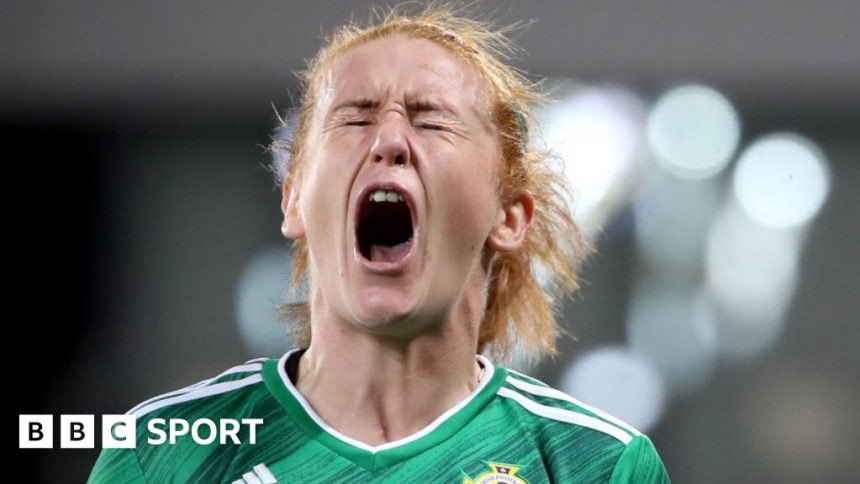‘I was lost’ – Dancing with fans, hiding the pain

-
Published
Sign up for notifications to the latest Insight features via the BBC Sport app and read the latest in the series here.
The sun was not only setting over Southampton, but also on Northern Ireland’s Euro 2022 adventure.
Not that you would think it by the scenes in St Mary’s.
After the final whistle of a 5-0 defeat by eventual winners England, Northern Ireland’s players and staff gathered in the corner of the pitch, singing and dancing in front of the travelling support.
Northern Ireland’s success had been reaching their first major tournament and whatever happened after was a bonus.
Their campaign was over after three matches, but it’s very existence was a reason to celebrate.
Rachel Furness was front and centre of it all. A fan favourite, she had found a ‘Green and White Army’ flag and was using it to conduct Northern Ireland’s supporters in the stands.
Things looked like they had never been better as she, along with everyone in green, danced and sung long into the night.
A few months previously, Furness had become Northern Ireland’s all-time leading goalscorer, been presented with BBC NI’s Sports Personality Award by Jurgen Klopp and had helped club side Liverpool to promotion back into the Women’s Super League.
From the outside, Furness was having the time of her life.
However, that could not have been further from the truth.
Just over a month after Northern Ireland’s joyful exit from the competition, the 35-year-old released a statement making herself unavailable for selection for international duty for the foreseeable future for “personal reasons”.
The messages of support from friends and team-mates were numerous and immediate, but they were accompanied with a palpable sense of shock.
For Furness though, it had been a long time coming. This is her story.
Furness leads Northern Ireland’s celebrations of their first major tournament campaign after defeat by England in their final Euro 2022 group game
“I remember at a point before the Euros, I was thinking ‘can I continue to do this?’. I had no escape,” Furness tells BBC Sport NI as she opens up about her mental health journey.
“It was a really, really tough decision, but the little girl in me wanted to play at a major tournament, to go and experience that.”
She boarded the plane to the Southampton, and, with her customary smile, made history stepping out against Norway in Northern Ireland women’s first match at a major tournament.
But behind the outgoing persona, things were brewing.
Midway through the tournament she wanted to go home for the sake of her mental health.
“You might think it’s crazy, but I just wasn’t happy,” says Furness.
“Everything just seemed so in place on the football side, it was going really well.”
In the background, everything wasn’t as rosy.
Off the pitch, she had been processing the end of a long-term relationship alongside her father’s illness.
Coupled with the high-intensity environment of a major tournament, she had reached breaking point.
“Personally, I wasn’t happy with myself in the environment,” Furness adds.
“Then you start to question, why? Why am I doing this? Why do I feel like this?”
After shedding some tears, she composes herself to recall the conversations as team-mates attempted to persuade her to remain in camp, rather than walk out on a campaign that was the pinnacle of all their international careers.
Furness and her fellow players talked long and deep, looking out from their hotel overlooking Southampton’s sun-kissed harbour. In the end, she was convinced to stay.
“I’m glad I did stay because I go back to that moment with the fans at the end, and thinking that was all worth it,” she says. “That’s the special moment I take away.”
But when the singing stopped, when the dancing was done, a decision remained.
Furness had managed to get through the tournament, but her mind was made up. She needed to take a step back from a team she loved so much.
After the tournament, she had conversations with staff about “how I was feeling, and how I was made to feel” and why she couldn’t carry on.
“It was tough to get across how I felt, and how mentally I was feeling,” she says.
“I did blame myself for a lot of that. Before I’d spoken to somebody and made sense of it, you do just blame yourself.
“I love representing Northern Ireland, and taking that risk of stepping back, never knowing if I’d step back in, was one of the biggest decisions of my life.
“Two years on you can tell it still touches and it still means a lot, but it’s one I can comfortably speak about now. I’m in a much better place for that.”
Furness, left, representing Northern Ireland at the World University Games in 2009
After making her debut in 2005, Furness established herself as one of the key members in NI’s squad.
Whether that be with her leadership, goal threat or even just the fact she played in England’s top tier – Furness is one of the most recognisable faces in Northern Irish sport.
Now sitting on 95 caps, she had been through the times of when players had to pay their way for matches, kit and training camps.
Having scored the opening goal in the first leg of Northern Ireland’s Euro 2022 qualification play-off against Ukraine, played on for 10 minutes with a broken leg and then celebrated victory in the return fixture by jigging about on crutches, Euro 2022 was to be a glorious climax to her career.
But things weren’t right.
“In the months before I did step back I know I wasn’t in the best place,” said Furness, who added she still works on her mental health daily.
“Football would have been a switch off in the past and would help deal with certain things, but when I was in an environment where I feel like it was then taking away, there is only so much you can take.”
After her decision to step away, Furness watched Northern Ireland’s next two fixtures – September’s World Cup qualifiers in Latvia and Luxembourg – from afar.
Knowing her body was fit and able to compete, she admits she briefly questioned her decision and wondered what would had happened had she continued.
“They were some of the hardest months of my life,” Furness says.
“I was proud of the girls, but I needed help. I was in a very bad place. I was lost.
“If you take Northern Ireland away from me, and in this case I took it away as it was my decision, that’s a massive part of me.”
During her hiatus from the national team, Furness made a choice that would change her outlook entirely.
She was still involved with Liverpool, although not playing the minutes that she would like.
An opportunity opened up to drop down a tier to Bristol City, who were vying for the Women’s Championship title.
Furness did not know anyone at the club, but with the prospect of a new beginning, she took a risk and made the move.
“My Liverpool team-mates could see daily that I was struggling,” she says.
“A lot of my friends and family wanted me to stay at Liverpool because they were scared I wasn’t in a good place or not strong enough to move.
“But having spoken to my psychologist – we flipped it on its head a bit. Can I be a positive impact to this young squad?
“None of them knew what had went on in my personal life. They just see it from the outside and they only know how much I let them know.
“It came at a really dark time, a different time in my life. I’m really thankful that it came about.”
Furness says her labrador, Bailey, has been “fantastic for my mental health” and “helped me through the roughest days”.
Furness praises the “fantastic” environment at Bristol which has helped her “create a life off the pitch” as well, with increased coaching roles.
However she believes that while mental health support is now a common feature of women’s football set-ups, there is still work to do normalising players making use of it.
“It’s never been made a normal conversation,” she says. “It’s ‘oh, the psychologist is in, book an appointment’, or a case of ‘what’s wrong?’.
“You could be in a good place and still speak to somebody. I still speak to a psychologist now.”
A Northern Ireland return was something that Furness never expected, but, as life improved on and off the pitch, the prospect became something she could consider, even welcome.
“If I’m honest I didn’t think I’d play for Northern Ireland again,” she says of her choice to step away in 2022.
“I had to be okay with that decision.
“But I found myself loving life at Bristol City. I was putting myself back together. I felt in a good place.
“When Northern Ireland got in touch, we had some conversations and I made myself available. Not knowing if I’d get selected, I just let them know that I’d feel comfortable coming back into the environment.
“If I felt stepping away was one of the hardest decisions, coming back was so difficult.”
For Furness, Thursday, 6 April 2023 is a day she’ll never forget. It was a typical spring day in Cardiff, with the frequent rain showers occasionally punctured by rays of sunshine.
More than that, however, it is when she wore Northern Ireland’s colours once more.
“I had never been so nervous,” she says of reintegrating into the national team camp where the Irish Football Association had offered her psychological support.
“I didn’t know how I was going to be received. I didn’t know how I was going to feel. It was tough. I was a shell of myself that Wales camp.
“I remember trying to have a few conversations, not to make myself feel comfortable in the environment, but to make the environment understand why I stepped away.
“I wanted the girls to understand where I was coming from.”
Furness won the second-tier Women’s Championship with Bristol City in 2022-23, but the Robins suffered relegations from the Women’s Super League this season
Furness had got the moment she had been waiting for with 25 minutes left to play at the Cardiff City Stadium. Interim manager Andy Waterworth, in charge after the departure of Kenny Shiels, summoned her from the bench and introduced her to the action.
In truth, Northern Ireland were outclassed that afternoon by Wales, losing 4-1, but it didn’t matter to Furness. She was back.
“I wanted to do myself proud,” she says. “It didn’t matter how well I played.
“For me, the strength was stepping over that white line and putting the shirt on again, to show that I could come back into the environment, to not be scared. If you do step away, you can still come back.”
Furness, who says she now “feels more myself” when in camp, acknowledges her playing career may be coming to an end in the next couple of years, but her thirst for the game remains and she is already planning her next steps.
Being honest with herself and her team-mates is top of the list.
“I want to lead by example and how I needed to allow myself to be vulnerable,” she says.
“If I had just carried on and acted as if everything was OK, continuing to play and putting on that brave face, even if my team-mates see me unhappy, then what example am I showing?
“I just hope that some of the young girls still look up to me and see that I was strong.
“Being vulnerable is not a weakness, it’s the ultimate strength.”
Information about about mental health provision and contacts is available via BBC Actionline.
Previously on Insight
-
-
Published17 May
-
-
-
Published9 May
-
-
-
Published7 May
-






